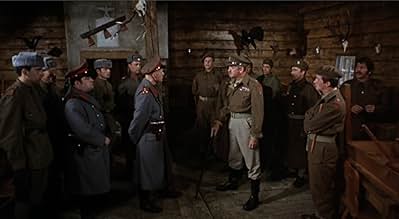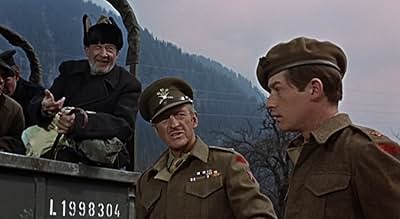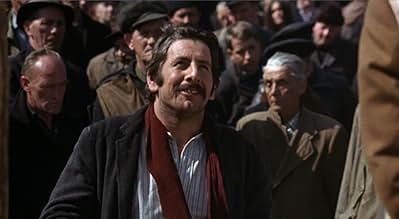अपनी भाषा में प्लॉट जोड़ेंAfter World War II, in an Austrian camp for displaced people, an interpreter mediates between the British and the Soviets regarding the fate of various refugees.After World War II, in an Austrian camp for displaced people, an interpreter mediates between the British and the Soviets regarding the fate of various refugees.After World War II, in an Austrian camp for displaced people, an interpreter mediates between the British and the Soviets regarding the fate of various refugees.
Hana Maria Pravda
- Beata
- (as Hana-Maria Pravda)
फ़ीचर्ड समीक्षाएं
This isn't really a comedy, despite it's billing in TV guides and some boisterous parts in the first half of the film. It is really a drama that tries to tell a story about different characters trying to make the best of their circumstances, amidst the near-chaos of post-war eastern Europe.
The backdrop and the sub-text of the film is that this is the preamble before the 'winter' of the cold war sets in; an unhappy state of affairs that suits no-one.
There is a fine cast in this film and it is mostly well-made. The camerawork uses a fair amount of the (then novel) zoom lens which is a little distracting, but not as distracting as some hand-held camerawork; an early example of 'shaky camera' for effect. Yeah, we get the point after ten seconds, we don't have to made ill by watching this for several more minutes, do we...?
If asked to criticise the casting and the acting performances, I can't help but think that Niven plays it a bit too straight, and that say, (a younger) Alec Guinness might have done a better job of it. But I am quibbling really; this is a pretty good film, well worth watching.
The backdrop and the sub-text of the film is that this is the preamble before the 'winter' of the cold war sets in; an unhappy state of affairs that suits no-one.
There is a fine cast in this film and it is mostly well-made. The camerawork uses a fair amount of the (then novel) zoom lens which is a little distracting, but not as distracting as some hand-held camerawork; an early example of 'shaky camera' for effect. Yeah, we get the point after ten seconds, we don't have to made ill by watching this for several more minutes, do we...?
If asked to criticise the casting and the acting performances, I can't help but think that Niven plays it a bit too straight, and that say, (a younger) Alec Guinness might have done a better job of it. But I am quibbling really; this is a pretty good film, well worth watching.
Following the abysmal 'Eye of the Devil' J. Lee Thompson and David Niven have teamed up again for ths film set in a displacement camp. Faced with a veritable Tower of Babel the commanding officer Major Burnside is sorely in need of an interpreter but is sent someone who knows only Ancient Greek and Latin. Luckily he stumbles upon a prisoner who is multi-lingual. Burnside turns a blind eye to his probably being a deserter but then his Russian counterpart starts to ask questions.......
Music can make or mar a film and the score by Ron Grainer is terminally irritating. The scenes between the Cockney and Russkie soldiers are decidedly naff. As for the principals Topol is okay as the interpreter but his appeal has always eluded me. Anna Karina's talent and beauty transcend a thankless role and Anthony Quayle is brilliant as a Brigadier who calls to mind Peter Ustinov's observation that 'the Army is the final repository of the fool'. The film really belongs to Niven. It is not at all unusual to see him in uniform but behind his character's military persona there is a resignation and world-weariness which is very touching. Decidedly one of his best post-Oscar performances. This film should have been better but is alas another of this directors near misses.
This film is set in post WWII occupied Austria that is split into zones run by the French, British, American and Russians respectively. Millions of people are displaced and refugee camps are formed in places like Austria to distribute refugees to places in this film like Linz and the West or Freistadt and eventually Russia.
It has elements of light comedy as the by the book British Major Burnside (David Niven) forbids 'fraternization' as he calls it but everybody seems to end up naked and frolicking in bed. Was I watching a Carry On film! Several border disputes with the Russians also provide more comic scenes including a border line that separates an alm establishment! The plight of the refugees has a more serious tone to proceedings.
Chaim Topol plays a character called Janovic, one such refugee but with a special 'talent' of interpreting several languages that proves useful to Burnside in dealing with the Russians in border disputes and such like. Topol steals the film for me with his comic touch and serious acting in other scenes.
Eventually it is revealed that Janovic is a deserter from the Russian army and to avoid a dispute with the allied (at the time) Russians is ordered to be returned to them, and probable death. Hardly comedic and that's one of the serious strands and very tragic ones.
Another serious strand is the story of Major Burnside during the War and the reason he has been placed at such outposts as this and later it transpires Indonesia.
A solid cast featuring the likes of David Niven, Topol, a young John Hurt, Anthony Quayle. Not a bad list and the film probably deserves greater recognition.
It has elements of light comedy as the by the book British Major Burnside (David Niven) forbids 'fraternization' as he calls it but everybody seems to end up naked and frolicking in bed. Was I watching a Carry On film! Several border disputes with the Russians also provide more comic scenes including a border line that separates an alm establishment! The plight of the refugees has a more serious tone to proceedings.
Chaim Topol plays a character called Janovic, one such refugee but with a special 'talent' of interpreting several languages that proves useful to Burnside in dealing with the Russians in border disputes and such like. Topol steals the film for me with his comic touch and serious acting in other scenes.
Eventually it is revealed that Janovic is a deserter from the Russian army and to avoid a dispute with the allied (at the time) Russians is ordered to be returned to them, and probable death. Hardly comedic and that's one of the serious strands and very tragic ones.
Another serious strand is the story of Major Burnside during the War and the reason he has been placed at such outposts as this and later it transpires Indonesia.
A solid cast featuring the likes of David Niven, Topol, a young John Hurt, Anthony Quayle. Not a bad list and the film probably deserves greater recognition.
Chaim Topol's career seems to have dwindled into endless revivals of his great role in 'Fiddler on the Roof' (cf Yul Brynner and 'The King and I'). So it's piquant to reconsider his first big break in Hollywood, two years before the film of 'Fiddler' catapulted him to fame.
'Before Winter Comes' highlights the decline of another once-rampant talent, director J. Lee Thompson. It is a mildly diverting entertainment, notable if only for its unusual setting: not World War two but its chaotic and tragic aftermath in four-power-divided Austria, with refugees in camps or roaming the snowy landscape looking for a home.
The centre of the story is an uneasy love/hate liaison. In the blue corner, bored, stiff, combat-nostalgic British senior officer David Niven ('I am nobody's old boy!'). In the red corner, a wily, Schweik-ish ex-Soviet displaced person whose polylinguality recommends him as a go-between when the UK occupying power is trying to co-exist with Stalin's boys as 'firm friends-- friends but firm'.
Niven could by now play a uniformed part asleep, and occasionally seems to have taken that as an order. His career was in low water at the time. It is a quieter part than in most of the ghastly comedies and capers he was doing at the time, but his bland technique is unaltered. Topol is fire to the Briton's ice: winking, grinning, suddenly looking sober and all-business, but how much is sincere and how much the pedlar's spiel? He's adequate, but Zorba-the-Greekishly unidimensional. Perhaps he always wanted to be liked a wee bit too much.
The film begins as lightish comedy, and tries for a change of pace to gravity and Cold War ominousness after Anna Karina insinuates a disturbing element as the love interest. But the gears clash. It looks like an Alistair McLean international adventure with more laughs, sprinkling doughty British thespians generously (Anthony Quayle as a brigadier, an amazingly unravaged John Hurt as a green junior officer) amid the Babel of displacement. Ron Grainer furnishes a whistling-squaddies theme to make you think of 'Bridge on the River Kwai', but the film lacks Lean's dedication to detail in the service of its message. Ultimately any theme deeper than 'Can't we all just get along?' is elusive. Nor is there any 'Great Escape' element to up the suspense.
The script was by Andrew Sinclair, a curious import to movies (Old Etonian, Cambridge academic, author of satirical novels) who sporadically tried to adapt his sour view of Britain to celluloid. The film looks too much 1969 rather than 1945, with Topol heavily hairy and a plethora of flashy zooms from Gilbert Taylor, Thompson's regular collaborator. They had been together, with Quayle, on 'Ice Cold in Alex'... which, alas, shows what a difference eleven years can make.
'Before Winter Comes' highlights the decline of another once-rampant talent, director J. Lee Thompson. It is a mildly diverting entertainment, notable if only for its unusual setting: not World War two but its chaotic and tragic aftermath in four-power-divided Austria, with refugees in camps or roaming the snowy landscape looking for a home.
The centre of the story is an uneasy love/hate liaison. In the blue corner, bored, stiff, combat-nostalgic British senior officer David Niven ('I am nobody's old boy!'). In the red corner, a wily, Schweik-ish ex-Soviet displaced person whose polylinguality recommends him as a go-between when the UK occupying power is trying to co-exist with Stalin's boys as 'firm friends-- friends but firm'.
Niven could by now play a uniformed part asleep, and occasionally seems to have taken that as an order. His career was in low water at the time. It is a quieter part than in most of the ghastly comedies and capers he was doing at the time, but his bland technique is unaltered. Topol is fire to the Briton's ice: winking, grinning, suddenly looking sober and all-business, but how much is sincere and how much the pedlar's spiel? He's adequate, but Zorba-the-Greekishly unidimensional. Perhaps he always wanted to be liked a wee bit too much.
The film begins as lightish comedy, and tries for a change of pace to gravity and Cold War ominousness after Anna Karina insinuates a disturbing element as the love interest. But the gears clash. It looks like an Alistair McLean international adventure with more laughs, sprinkling doughty British thespians generously (Anthony Quayle as a brigadier, an amazingly unravaged John Hurt as a green junior officer) amid the Babel of displacement. Ron Grainer furnishes a whistling-squaddies theme to make you think of 'Bridge on the River Kwai', but the film lacks Lean's dedication to detail in the service of its message. Ultimately any theme deeper than 'Can't we all just get along?' is elusive. Nor is there any 'Great Escape' element to up the suspense.
The script was by Andrew Sinclair, a curious import to movies (Old Etonian, Cambridge academic, author of satirical novels) who sporadically tried to adapt his sour view of Britain to celluloid. The film looks too much 1969 rather than 1945, with Topol heavily hairy and a plethora of flashy zooms from Gilbert Taylor, Thompson's regular collaborator. They had been together, with Quayle, on 'Ice Cold in Alex'... which, alas, shows what a difference eleven years can make.
David Niven stars in this rather unremarkable post-war comedy drama set in an Austrian camp that sorts out and repatriates displaced people. He leads the British contingent with Ori Levy ("Capt. Kamenev") his Russian counterpart with whom he has an uneasy sort of truce. Topol is their charismatic interpreter/peace broker "Janovic" who oils the wheels of their procedures - but he has a secret and when Niven and the Russian find out, he finds life becomes quite precarious. The comedy struggles, to be honest - Niven tries hard, but Topol too hard - neither seem to really want to be here. The presence of the naively optimistic young "Lieut. Pilkington" (John Hurt) and the cynical "Brig. Bewley" (Anthony Quayle) - who is aware of an incident in Niven's past, suggests that there is an underlying message in the film, but nothing really hits home. There are duty versus compassion clashes, and imperialist versus communist ones too - but the setting and characterisations don't support any real substance to these, and the films flails a bit before an ending that is surprisingly robust.
क्या आपको पता है
- ट्रिवियाAlysoun Austin's feature-film debut, playing the role of "A.T.S. Driver."
- गूफ़The John Hurt character (Lieutenant Pilkington) has long hair, like John Lennon, not in keeping with British army regulations.
- भाव
Major Burnside: What languages do you speak?
Janovic: Russian, Polish, Greek, Hungarian, German, Romanian, Bulgar, Serbo-Croat, Romani, Italian, some Arabic, some Yiddish, a little Chinese.
- क्रेज़ी क्रेडिटOpening credits prologue: OCCUPIED AUSTRIA SPRING, 1945
टॉप पसंद
रेटिंग देने के लिए साइन-इन करें और वैयक्तिकृत सुझावों के लिए वॉचलिस्ट करें
- How long is Before Winter Comes?Alexa द्वारा संचालित
विवरण
- चलने की अवधि1 घंटा 47 मिनट
- पक्ष अनुपात
- 1.85 : 1
इस पेज में योगदान दें
किसी बदलाव का सुझाव दें या अनुपलब्ध कॉन्टेंट जोड़ें



































